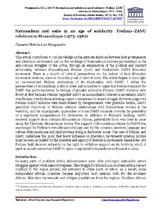| dc.contributor.author | Munguambe, Clinarete Victoria Luis | |
| dc.date.accessioned | 2018-10-16T12:28:15Z | |
| dc.date.available | 2018-10-16T12:28:15Z | |
| dc.date.issued | 2017 | |
| dc.identifier.citation | Munguambe, C.V.L. (2017) Nationalism and exile in an age of solidarity: Frelimo–ZANU relations in Mozambique (1975–1980). Journal of Southern African Studies, 43(1): 161-178. | en_US |
| dc.identifier.issn | 0305-7070 | |
| dc.identifier.uri | http://dx.doi.org/10.1080/03057070.2017.1273537 | |
| dc.identifier.uri | http://hdl.handle.net/10566/4130 | |
| dc.description.abstract | This article contributes to our knowledge on the intricate relations between host governments
and liberation movements and on the workings of transnational military partnerships in the anticolonial
struggles of the 1970s, through an examination of the political and military relationship
between Mozambique’s Frelimo (host) and Zimbabwe’s ZANU liberation movement. There is
a dearth of critical perspectives on the nature of host–liberation movement relations, more
so from the point of view of hosts. The article begins to shed light on un-researched Frelimo
evaluations of its relationship with ZANU. I utilise the perspectives of Mozambican political
elites and non-elites to argue that Frelimo’s support for ZANU was partly motivated by feelings
of genuine solidarity. Frelimo–ZANU relations were frosty at first because Frelimo regarded
ZANU as an inauthentic liberation movement. ZANU won Frelimo over by demonstrating cogent
commitment to armed struggle. However, improved Frelimo–ZANU relations were characterised
by disagreements over guerrilla tactics, ZANU guerrillas’ objections to Frelimo soldiers’
relationships with Zimbabwean women at the warfront, and the unpragmatic approaches of
some ZANU elements towards the possibility of a negotiated independence for Zimbabwe. In
addition to Frelimo’s backing, ZANU received support from ordinary Mozambican citizens,
particularly those who lived in areas along the Rhodesia–Mozambique border. The support of
Mozambican citizens for ZANU was encouraged by Frelimo’s revolutionary ideology and by the
common ancestry, language and culture of Mozambicans and Zimbabweans living in the border
zones. The case of Frelimo and ZANU underlines the point that hosts’ influence on liberation
movements’ internal politics must be seen as limited by the interests and agency of liberation
movements themselves. But Frelimo held decisive authority on the right to withdraw support
on its territory, which it used as an inducement on ZANU to agree a negotiated independence
settlement in 1979. | en_US |
| dc.language.iso | en | en_US |
| dc.publisher | Taylor & Francis | en_US |
| dc.rights | This is the author-version of the article published online at: http://dx.doi.org/10.1080/03057070.2017.1273537 | |
| dc.subject | Frelimo–ZANU | en_US |
| dc.subject | Zimbabwe’s ZANU liberation movement | en_US |
| dc.subject | Inauthentic liberation movement | en_US |
| dc.title | Nationalism and exile in an age of solidarity: Frelimo–ZANU relations in Mozambique (1975–1980) | en_US |
| dc.type | Article | en_US |
| dc.privacy.showsubmitter | FALSE | |
| dc.status.ispeerreviewed | TRUE | |

